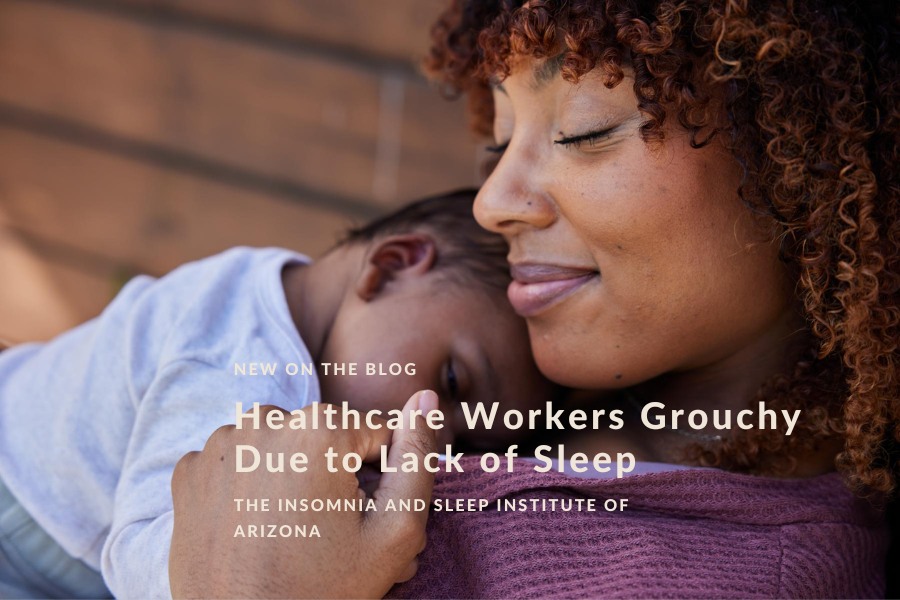Have you noticed that your EMT or other healthcare provider isn’t in the best of moods? Just like the rest of us, these workers are going to be challenged when they don’t get enough quality sleep—and their work combines demanding schedules with a lot of stress (especially with COVID). At The Insomnia and Sleep Institute of Arizona, we help everyone achieve better and more sleep, and have found that oftentimes those who come in complaining of sleep issues work in the healthcare field. Our ability to show empathy and compassion is in part informed by the quality of sleep we get. Sleep deprivation and emotional fatigue have a strong connection.
When a healthcare worker isn’t getting the sleep they need, they are less likely to be able to fully understand how a patient feels. You can imagine what kind of outcomes this might yield. One cognitive neuroscientist recently took a closer look at emotions in those working in healthcare, considering how the brain problem-solves and thinks. It’s well-known that when we don’t sleep enough, we can’t remember information, solve problems as well, react as quickly, multi-task, or regulate/understand emotions. So what does that mean for those who work so closely with those in a health crisis?
Moods, Emotions, and Sleep
Not getting enough sleep changes our emotions and moods. No matter the reason for a poor night’s sleep, everyone knows how it feels to wake up groggy and tired. We might say it affects our moods and emotions, often lumping these two things together—but they are actually quite different. Moods are defined as short-term (thus the term “mood swing”). However, emotions are learned responses from people or situations. They can vary in intensity. It’s tough for us to understand our own emotions, so figuring out the emotions of others is even more challenging—and yet a required task for healthcare workers.
Empathy is our ability to read and understand the emotions of another person. A study was designed in 2014 via Neurolab to figure out how just one night without sleep would change a person’s ability to empathize. The empathy test in this study showed participants image of different people in neutral, positive, and negative situations. There were photos of people laughing, sitting down, and in pain. Participants were asked to describe what the people in the images were feeling, then asked to rate their own emotions as they viewed the images.
Before the test, which was comprised of university students, all participants were also tested for their baseline empathy. Next, everyone spent the night together in a sleep lab watching movies, playing games, and hanging out. No sleep was allowed. The following morning, they were re-tested on empathy. The results were clear. When people don’t get enough sleep, they feel less empathy for those they view in negative situations. However, this study was extreme. It’s rare that someone gets no sleep at night. Researchers were curious if extreme sleep deprivation was the only cause leading to this, or if simple “lack of sleep” could yield similar effects?
Chronic Sleep Deprivation and Empathy
The researchers then found that “chronic poor sleep” was also connected to less empathy. Of course, one profession where chronic sleep deprivation is common is in paramedics. They have shift work for years and are the first to respond to traumatic and stressful situations, so of course having empathy is going to be necessary to do their job. Researchers used the same test with paramedics. The participants were either trainees or had at least five years of experience. Before the study, they reported on any sleep issues and many reported they felt “numb” to the pain of others.
This might not only be due to lack of sleep. Commonly, lack of empathy, emotional numbness, and sleep disorders are also signs of post-traumatic stress disorder (PTSD). In fact, PTSD is a common comorbidity of sleep disorders. The Centre for Suicide Prevention in Canada reports that first responders, like paramedics, are twice as likely to have PTSD than those who do not have such stressful jobs. Throughout the pandemic, first responders also experienced a spike in insomnia, PTSD, anxiety, and depression.
Sleep as a Cure
Better sleep cannot “cure” PTSD, but it can improve the symptoms. Regardless of your profession, you need enough quality sleep for every part of your life—including experiencing empathy for others. Empathy is an essential tool that helps us be a contributing member of society and for fostering all of your relationships. To find out more about help with sleep disturbance, schedule a consultation with a sleep expert today. Call The Insomnia and Sleep Institute during business hours or, for the fastest response, fill out the online contact form today.





